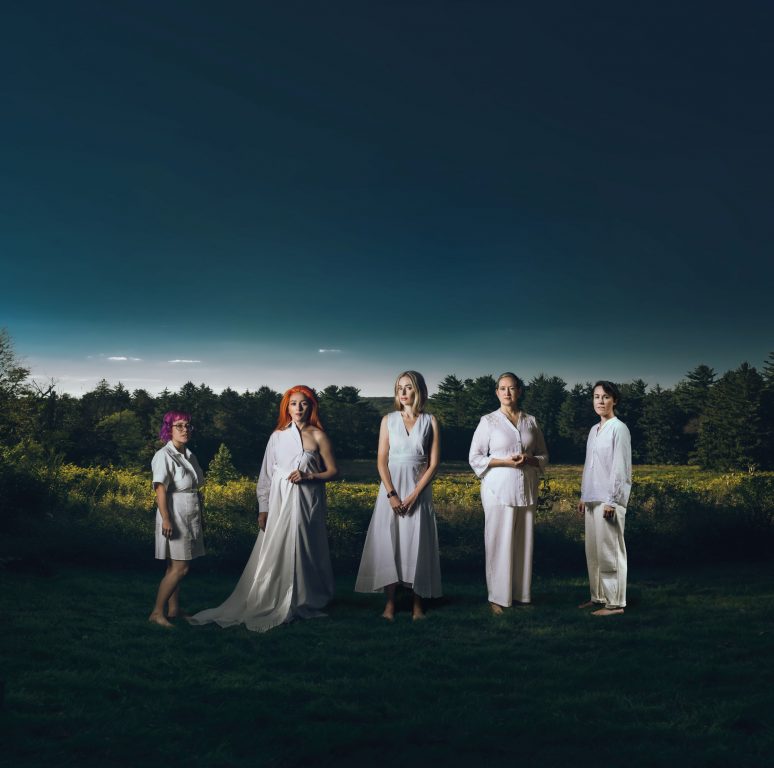Present Music Presents Acclaimed Work by 5 Women Composers
Performing The Blue Hour; a recording of it was an NPR Top 10 Album of 2022.

Blue Hour composers. L to R, Angélica Negrón, Shara Nova, Sara Kirkland Snider, Rachel Grimes, Caroline Shaw. Photo by Anja Schutz.
Present Music presents an award-winning song cycle, The Blue Hour, featuring mezzo-soprano Shara Nova performing with the backing of the Present Music ensemble at the Milwaukee Art Museum on Thursday evening, April 11. Deanna Tham, Associate Conductor of the Oregon Symphony, will conduct.
The poet Carolyn Forché could have led a ‘normal’ life. Born in Michigan, she taught poetry at a variety of colleges, currently Georgetown University. But she has set out to be a witness to human tragedies around the world, not as a journalist but as a poet. She describes her work as a ‘poetry of witness.’
The text is selected from an epic-sized poem, On Earth from her book Blue Hour, which “catalogs the scattered thoughts, visions, and imagery of a life passing ever closer to death, organized through the objective but arbitrary tool of alphabetization.” Images and observations are strung together by organizing phrases alphabetically. The music follows one woman’s journey through the space between life and death, exploring her memories of childhood, war, love, and loss. This reflects the poem’s focus on the fragility and beauty of human life. The impressionistic images fly by fast.
An example:
early summer’s green plums
earth singing in her magma chambers
easter lilies opening in
elegiac time
empty windows dipped in milk
Occasionally single words are strung together — simple images with evocative alliteration — “enigma, escritoire, estuary”
The music that sets the poem draws similarly from an eclectic range of influences. The project to create a collaborative song cycle was a daunting one. The poem often built of fragmentary thoughts was sampled and repackaged as a more coherent whole through the effort of five respected women composers, including Shara Nova, Rachel Grimes, Angélica Negrón, Caroline Shaw and Sarah Kirkland Snider.
Five collaborating composers reveal personal styles. Grimes and Nova bring a more melodic approach. Snider and Negrón add energy through insistent instrumental scores. Shaw experiments with tone and sounds, playing more with words and borrowing moments from Baroque and religious musical styles. Each composer contributed short works, which were then strung together into 40 songs, a process that involved extensive collaboration.
Reviewer Amanda Cook singled out these highlights: “Though grounded in a shared aesthetic, plenty of moments from the individual composers stand out. Grimes’ ‘the name’ is blissfully tender with resonant string writing, and Snider’s ‘each a ring of soot’ is a bright, irregular-metered hocket. Nova’s ‘library, lilac’ features a loose recitative style text delivery over a driving bass line, and ‘nevertheless’ puts the warm, sonorous tone of viola soloist on full display. The ensemble establishes a lilting mixed meter groove by Negrón, chanting ‘canticle, casement, cask, cerement, cinder,’ and later, Negrón weaves together a delicate ricochet bowing echo effect on a single pitch in ‘her hair.’ In ‘Firmament,’ Shaw juxtaposes the rhythmic drive of Baroque music and minimalism using quotations from the second Brandenburg Concerto and invokes monophonic chant at the mention of a Kyrie. The stunning conclusion of the work plunges the audience into a deep blue light for Shaw’s haunting canon ‘all of this must remain.'”
Heard without focusing on the unique text, the music is a bit evocative of Judy Collins – the mezzo voice, metaphors that spark a flash of recognition, the extravagant and serious accompaniment. But the text and the quality of the miniature compositions by each of the five composers raises the whole to another level. A recording released on Nonesuch Records was included in NPR’s Top 10 Albums of 2022. The recording may be previewed on YouTube. Forché’s The Blue Hour is available as a Kindle book for $7.00. The impact of the substantial ‘On Earth’ poem sets in only when getting lost within it.
The song cycle, on the other hand, offers a 70-minute immersion into the mind of the poet, mediated by terrific composition.
The Blue Hour will be performed by Nova and the Present Music ensemble at the Milwaukee Art Museum on Thursday April 11, at 7:30 p.m. The Museum will be open to ticket holders on the day of the concert. Tickets may be purchased online. Premium seats may be worth the price as the Windhover Hall beneath the Calatrava wings is set for many rows of seating. The stage is elevated but the floor is flat.
Two special museum exhibits are identified as relevant to this event: “50 Paintings,” a curated collection of representative contemporary art, and “Idris Khan: Repeat After Me,” by an artist and photographer exploring repetitive patterns in art.
To end the season, violist/conductor/curator Nadia Sirota makes her first appearance with Present Music, and brings a program of her favorite composers, including Nico Muhly, Steve Reich, Gabriella Smith, Marcos Balter, and Andrew Norman. The program, entitled Honest Music, will play Thursday evening, May 9, also at the Milwaukee Art Museum.
If you think stories like this are important, become a member of Urban Milwaukee and help support real, independent journalism. Plus you get some cool added benefits.





















A question for Michael Brandt: Isn’t this musical event scheduled for exactly the same time as the St. John’s resident + designated guest Fine Arts Quartet performance also on April 11th? Why would you do that?